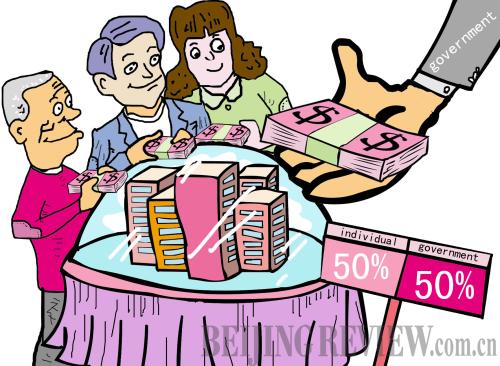|
 |
|
(LI SHIGONG) |
Recently, a local government's decision to pay part of housing costs for individuals attracted nationwide attention. In an effort to help middle and low-income groups buy apartments, the government of Huai'an City of Jiangsu Province pays 30-50 percent and owns the same proportion of the apartment. After five to eight years, as long as the purchaser pays back the government funding, the apartment will be completely owned by the purchaser.
Joint ownership has been practiced in Huai'an since 2007. At the early time, the local government maintained a low profile and the practice was rarely known to the wider public. But during this year's National People's Congress, how to deal with skyrocketing housing prices was one of the hottest topics, and that pushed the Huai'an model into the spotlight.
The full name of the Huai'an model is "joint ownership affordable housing project." The core concept is that the purchaser and the government own the apartment according to their contributions; the purchaser will be able to own the apartment when he or she pays off the government contribution.
Purchase of a joint ownership apartment has certain strings attached. The Huai'an government regulation says, within five years, the purchaser can buy government ownership at the original price, and the government will not charge the purchaser rent. But, after five years, the purchaser's buy-back will be subject to market prices, and if there is a failure to do so, the purchaser has to pay a certain proportion of rent to the government.
Under joint ownership, the purchaser is entitled to mortgage and sell the apartment. If the purchaser cannot pay back bank loans, the government can take on the responsibility. But the proportion of the purchaser will shrink accordingly. If the purchaser fails to pay off the government contribution, he or she can still stay in the house as long as he or she wants. But if the apartment is sold, he or she should split the proceeds with the government.
Many experts agree the Huai'an model is a positive effort in resolving low-income families' housing problems. On the one hand, the government has in effect given the purchaser an interest-free loan, lowering the threshold for poor families who want to buy apartments. On the other hand, the prices of such apartments are just 5-10 percent lower than market prices, leaving less room for purchasers' windfall from reselling, which in turn curbs speculation.
Law experts engaged in the stipulations of a housing guarantee bill said the draft law agrees the government and the purchaser can share the ownership of an affordable apartment.
In spite of these benefits, some people suspect the government is intending to drive up housing prices and this might in effect mean a greater burden on purchasers.
A good try
Xu Xunlei (Yangcheng Evening News): The prices of commercial housing projects are becoming more and more incredible, making it necessary to expand the supply of affordable housing projects by all means. The joint ownership project is a brand new attempt in this area.
The newly drafted housing guarantee law also raised the concept of "joint ownership." The draft law makes clear the proportions the government and the purchaser should own. If the purchaser fails to pay off the government funding, he or she can live in the apartment as long as he or she lives. It is a housing guarantee as well as government solicitude for low-income people.
The Huai'an model provides a practical base for the draft housing guarantee law. Even people in developed countries have difficulties in buying apartments. In Britain, the government proposed a similar joint ownership model five years ago to provide a shelter for poor families.
Compared with affordable housing projects, the joint ownership apartment is less likely to be misused, as a major part of the apartment is owned by the government that forbids the purchasers to dispose of it willfully. Current affordable housing projects have many defects, providing room for potential to falsify documents and cheat. In some cases, people drive luxury cars and live in affordable houses, which is a malfunction contrary to the intention of providing affordable housing.
Huang Yunxiang (Securities Times): Due to an inadequate credit check system, a lot of problems stem from the current affordable housing projects, such as fraud and corruption. It is an open secret that some people forge documents to get affordable apartments.
Under the joint ownership program, the government subsidy can be quantified so that everyone can see clearly how much the government has paid. If you are qualified for joint ownership, the government does not take any profit from owning part of the apartment and, at the same time, the owner should not rent it for the purpose of making money. In this way, the government can effectively prevent false document problems, and guarantee the housing needs of low-income people.
Zheng Jingwei (Xiaoxiang Morning Herald): The advantage of the joint ownership model is that the government and the purchasers are tied together and become stakeholders, so the purchasers do not have to worry about being taken advantage of by real estate developers.
| 